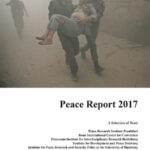Beschreibung
The Peace Report
is the joint yearbook of Germany’s peace and conflict
research institutes and has been published in German
annually since 1987 and in abridged form in English since
2012. Researchers from various disciplines examine ongoing
international conflicts from the perspective of peace
strategy. Their analyses form the basis of the editors’
statement, which takes stock of pressing issues and
formulates policy recommendations.
How can violence be contained when the cooperative world order is collapsing?
International politics is marked by severe turbulence. The
basis for establishing a cooperative world order is eroding,
global inequality is increasing, the hopes placed in
international law are being frustrated. Syria represents the
failure of the community of nations to prevent war crimes
and mass atrocities. After experiences in Afghanistan, Iraq
and Libya, the assumption in the West that it would be
possible to curb or contain civil wars by military means or
even impose democracy has evaporated. Russia is operating in
a revisionist manner in the Ukraine, and is waging a war in
Syria to establish its own status as a superpower. Donald
Trump’s election marked a turn in the direction of
uncertainty. Under the banner of “America first”, the US
is abandoning the world order policy it has pursued since
1941 and seems to want to replace multilateral cooperation
with protectionism.
We ask how armed conflicts can be prevented under these
conditions. Facing massive pressure from nationalists and
anti-European isolationists, the EU must cope with
dramatically changed challenges internally as well as beyond
its borders. Nolens volens, Germany’s influence
and responsibility are growing in Europe and in
international politics. What strategies and instruments are
appropriate for limiting excessive use of violence and
setting behavior in train that emphasizes solidarity and
promotes peace? To examine these issues, we analyze a
variety of peace processes and negotiations.
This abridged English volume of the 2017 Peace Report
explores how the US under Trump impacts transatlantic
relations, asks if the EU is finished as a force for peace,
examines how bans on violence can be implemented in
practical terms while protecting people, asks if imposing
sanctions are any use at all, and highlights the importance
of the UN Agenda 2030 for Sustainable Development when
building global consensus in the face of blinkered
nationalism.
The Peace Report is published on behalf of the five German
peace research institutes by Bruno Schoch, Andreas
Heinemann-Grüder, Corinna Hauswedell, Jochen Hippler and
Margret Johannsen, and continues to be supported by the
German Foundation for Peace Research.
www.friedensgutachten.de


